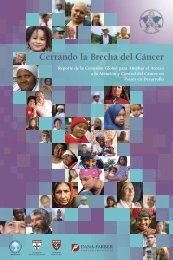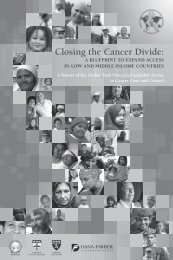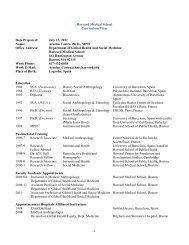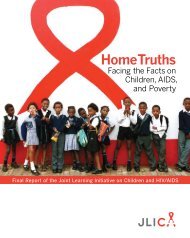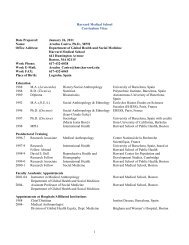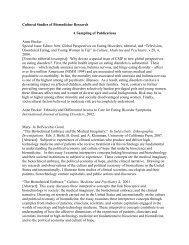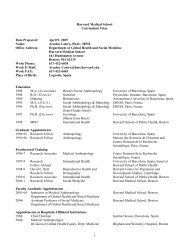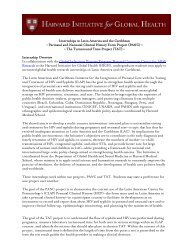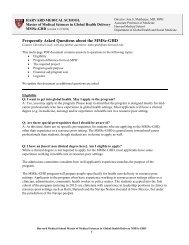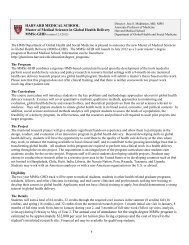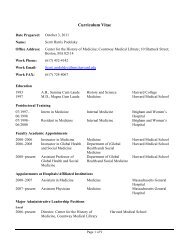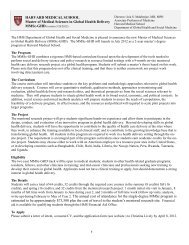Haiti Case Study - The Department of Global Health and Social ...
Haiti Case Study - The Department of Global Health and Social ...
Haiti Case Study - The Department of Global Health and Social ...
You also want an ePaper? Increase the reach of your titles
YUMPU automatically turns print PDFs into web optimized ePapers that Google loves.
CONTRIBUTIONS OF GLOBAL ACTORS<br />
36. Since <strong>Haiti</strong> is a crisis-affected fragile state, it should come as no surprise that there is a<br />
great deal <strong>of</strong> involvement by foreign actors in the country, interacting with most <strong>of</strong> the<br />
country’s systems, including the health system. <strong>The</strong>se actors run the gamut from<br />
International aid agencies to the various UN humanitarian agencies (through the “cluster<br />
system), the World Bank, <strong>and</strong> bilateral governmental aid donors such as the US Agency for<br />
International Development (USAID). In addition to the governmental <strong>and</strong> international bodies<br />
active in <strong>Haiti</strong>, it is estimated that—as described in the next section <strong>of</strong> <strong>Haiti</strong>’s health system—<br />
over ten thous<strong>and</strong> NGOs were operating in <strong>Haiti</strong> prior to the earthquake 32 . And, <strong>of</strong> particular<br />
relevance to this report, <strong>Haiti</strong> has hosted a UN stabilization mission since 2004 called<br />
MINUSTAH (from the French version <strong>of</strong> the mission’s <strong>of</strong>ficial name: Mission des Nations<br />
Unies pour la stabilisation en Haïti).<br />
37. To underst<strong>and</strong> the extent <strong>of</strong> the role played in <strong>Haiti</strong> by global actors, it is instructive to<br />
again refer to the context provided by the ALNAP report. Official development assistance<br />
funding for 2008 totalled nearly one billion US dollars, nearly 13% <strong>of</strong> GDP, <strong>of</strong> which<br />
approximately one fifth was humanitarian assistance. According to the OECD 33 , the largest<br />
donors were the United States, Canada, the Inter-American Bank <strong>and</strong> the European<br />
Commission. Additionally, the international community spent 575 million US dollars on<br />
stabilization <strong>and</strong> peacekeeping in 2008 34 .<br />
38. <strong>The</strong> role <strong>of</strong> the UN in <strong>Haiti</strong> is particularly noteworthy. MINUSTAH, which replaced an<br />
earlier UN force in 2004 following the coup against Jean-Paul Aristide, has the m<strong>and</strong>ate to<br />
ensure a secure <strong>and</strong> stable environment, <strong>and</strong> in 2009 was further tasked with supporting the<br />
<strong>Haiti</strong>an political process. MINUSTAH’s authorized strength when the earthquake struck was<br />
6940 military personnel <strong>and</strong> 2211 police. MINUSTAH has played an important role in<br />
reducing gang violence in <strong>Haiti</strong>’s slums 35 <strong>and</strong>, thanks to the combined efforts <strong>of</strong> the <strong>Haiti</strong>an<br />
authorities, the United Nations, <strong>and</strong> the international community, violence had largely been<br />
removed from politics, public security mostly restored, <strong>and</strong> crime reduced 36 . In 2009 the UN<br />
also appointed a special envoy to <strong>Haiti</strong>, the former U.S. president Bill Clinton, whose role is<br />
to “Work with the <strong>Haiti</strong>an Government <strong>and</strong> people as they implement their vision for recovery<br />
<strong>and</strong> beyond in an effort to maximize job creation <strong>and</strong> sustainability”. <strong>The</strong> Special Envoy<br />
plays an important role in seeking pledges for <strong>of</strong>ficial development assistance. Besides the<br />
special envoy <strong>and</strong> MINUSTAH, multiple other UN agencies <strong>and</strong> bodies were represented in<br />
<strong>Haiti</strong> prior to January 2010.<br />
39. All <strong>of</strong> these global actors ostensibly work in support <strong>of</strong> the government <strong>of</strong> <strong>Haiti</strong>, but, as<br />
stated in by the International Crisis Group in a 2009 report on the state <strong>of</strong> <strong>Haiti</strong>’s<br />
environmental protection, coordination among them prior to 2010 has not been optimal:<br />
In the absence <strong>of</strong> effective state policies, foreign assistance has sought to fill the void, but<br />
a clear strategic <strong>and</strong> comprehensive policy approach does not exist. Funding fluctuates<br />
in accordance with political circumstances, donor strategies vary, <strong>and</strong> the government<br />
has little influence over the use <strong>of</strong> funds. Project visibility, not good results, is <strong>of</strong>ten the<br />
priority. 37<br />
40. During the several natural disasters which affected <strong>Haiti</strong> during the first decade <strong>of</strong> the<br />
new millennium, the international community present in <strong>Haiti</strong> made efforts to coordinate its<br />
response <strong>and</strong> work with <strong>Haiti</strong>an authorities to reduce risk from natural disasters; in 2008, in<br />
anticipation <strong>of</strong> the hurricane season, a UN cluster system was rolled out. <strong>The</strong> ALNAP report<br />
cites the positive impact on coordination <strong>of</strong> these efforts but notes that other observers<br />
continued to see a “striking disconnect” between the international community <strong>and</strong> <strong>Haiti</strong>. In<br />
particular it notes that “A study <strong>of</strong> NGOs operating in <strong>Haiti</strong> observed that while larger<br />
international NGOs’ efforts to coordinate amongst themselves have proved successful,<br />
smaller, grassroots organisations face constraints in time, money or modes <strong>of</strong><br />
communication to access <strong>and</strong> coordinate with other like-minded organisations”.<br />
8



